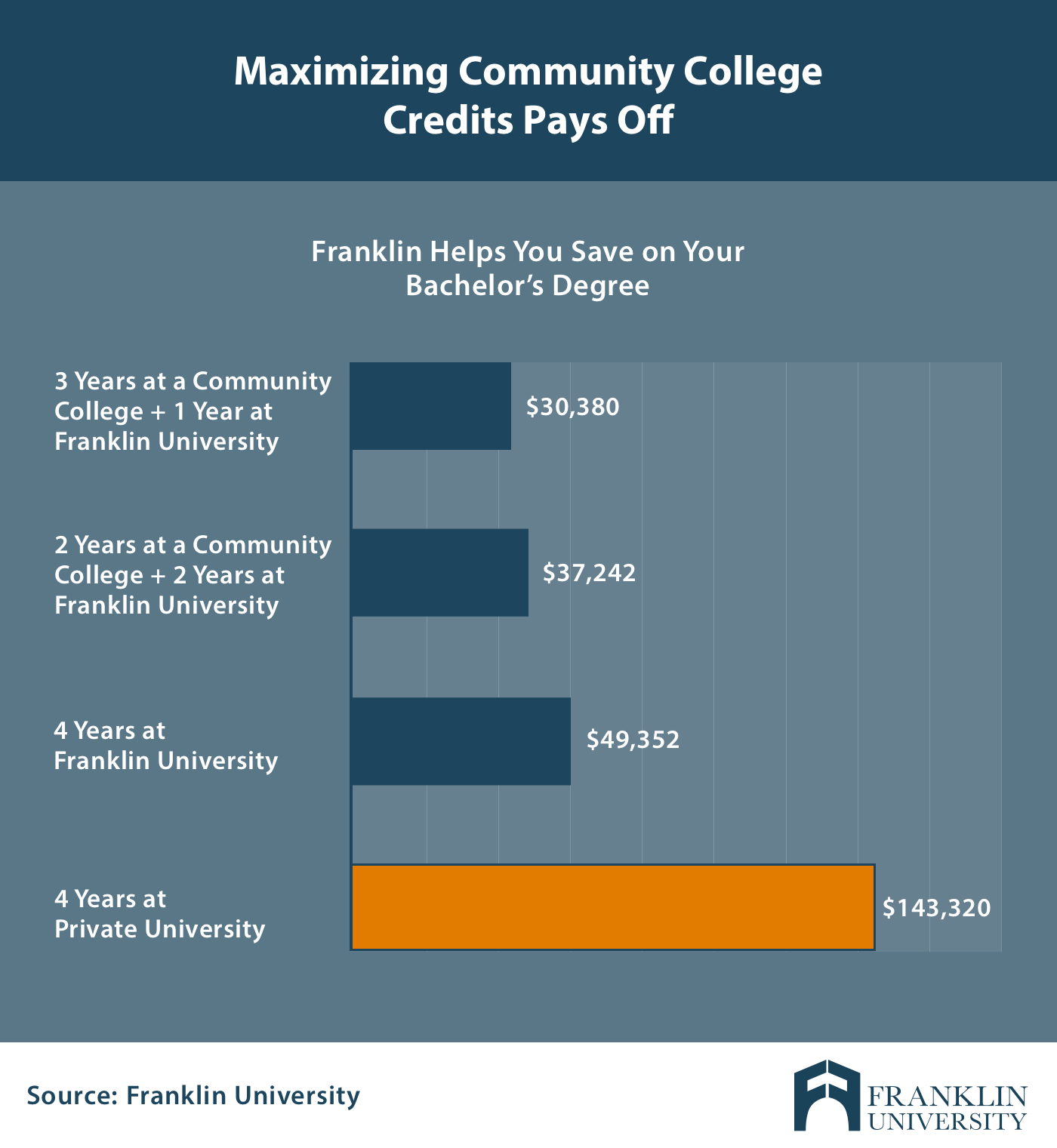Request Information
We're Sorry
There was an unexpected error with the form (your web browser was unable to retrieve some required data from our servers). This kind of error may occur if you have temporarily lost your internet connection. If you're able to verify that your internet connection is stable and the error persists, the Franklin University Help Desk is available to assist you at helpdesk@franklin.edu, 614.947.6682 (local), or 1.866.435.7006 (toll free).
Just a moment while we process your submission.

Online College Transfer Credits: Answers to 8 Important Questions
Transferring to a new college can feel like an overwhelming and complicated process. One of the biggest concerns for transfer students is figuring out transfer credit. Will your new school accept transfer credits from your previous college? How many credits will be accepted and how will they be applied toward your degree? Does it matter if you attended an online or traditional college?
Every college and university sets their own rules for transfer credits. Transferring college credits between online colleges and traditional universities can also come with a unique set of circumstances.
Whether you’re transferring from community college to a four-year degree or resuming your degree after a prolonged break—you want to maximize transfer credits so your hard work isn’t wasted. We’re here to help. While each university has unique transfer credit policies, we’ve worked with our transfer credit experts to create a high-level guide to this process.
Can You Transfer College Credits To An Online College?
Yes, the majority of online colleges accept transfer credits. Whether you’re currently attending a traditional university, earned some credit but no degree, or completed an associate degree, getting transfer credit at an online college may be easier than you think.
Online colleges are often built to meet the needs of nontraditional students, many of whom are working adults with some previous college credit. Typically, this means they have flexible transfer credit policies that accept a more generous amount of credits than their traditional university counterparts. Also, unlike many traditional schools, online colleges will make it easier to transfer credits at all degree levels—from associate degrees all the way to doctorate degrees.
Do Online Schools Accept Transfer Credits From Community College?
If you’ve earned your associate degree, or even just completed courses at a community college, online colleges are likely to accept this credit. One of the biggest questions is not if, but how, this credit will transfer. Each online college will evaluate your community college courses to determine how they apply to your new bachelor’s degree program.
If you completed an associate degree, you will typically enter your four-year program at a junior standing. Your general education requirements are normally met through your associate degree credit transfer. That leaves two years of coursework to complete—most of which will be in your major area.
One of the best ways to ensure your credits transfer is to see if your community college partners with four-year schools. You may even be able to earn more credit at your community college before transferring, saving you money on tuition. For example, Franklin University’s Community College Alliance, offers a 3+1 program, which creates a seamless pathway to your bachelor’s degree. Through this program, you can earn 75% of your credits at your community college, which can save 40% of the total cost of a bachelor’s degree.

If you’re attending community college, it’s never too early to think about transferring to a four-year institution to complete a bachelor’s degree. The sooner you start planning, the easier it will be to maximize your transfer credits.
Accelerate your completion time and lower your total tuition cost at every academic level. Download this free guide for tips on maximizing your transfer credit.
Will A State University Accept Transfer Credits From Online Classes?
Maybe—it’s often more difficult to transfer from an online program to a state school than the other way around. Traditional institutions tend to require very specific courses and are usually not as flexible when it comes to transfer credit. Differences in curriculum or course requirements and limits on how many credits can transfer may result in losing progress toward a degree.
Even if a school accepts certain classes for transfer credit, that doesn't mean it will apply to your degree program. Be sure to understand not only how many credits transfer, but how many credits you will still need to complete to earn your degree.
What Counts or Doesn’t Count as Transfer Credit?

Transfer credit can be more than previous college coursework—if you choose the right online college. Online colleges are more likely to accept transfer credits from a variety of sources. Less traditional credits online colleges may accept include:
- Exam or test scores from recognized testing organizations, including DSST, CLEP and UCEL.
- Professional experiences, including business and industry courses, professional training and specialized certifications.
- Military training credit can be granted by submitting your military transcripts and certifications.
- Pre-evaluated learning evaluated by the American Council on Education can help align previous training and experiences with college courses.
- Portfolio credit provides an opportunity to demonstrate knowledge that cannot be assessed through exams. Your portfolio must illustrate that your existing knowledge aligns with the learning outcomes assigned to that specific course.
Franklin University makes an effort to accept all of these types of credit. However, every college will have different types of credit it accepts and methods of evaluation, so be sure to research the policies of individual institutions.
How Is Transfer Credit Determined at an Online College?
There are a number of factors that determine what can be accepted as transfer credit and how it will be calculated toward your degree. This process varies college by college, and there is no mandated process for determining transfer credits. However, many colleges will follow guidelines set forth by their state.
Franklin University follows the guidelines of the Ohio Department of Higher Education. At the undergraduate level, Franklin accepts courses from regionally and non-regionally accredited institutions. At a high-level, Franklin’s guidelines for determining undergraduate transfer credit include:
- Credits must be submitted to Franklin from an accredited institution* or the U.S. Department of Education.
- Coursework from non-accredited institutions must go through Franklin’s formal, case-by-case review process to determine transferability.
- Credit will be accepted for any college course completed with a grade of “D” or higher, including grades of “Pass” and examination credit, subject to GPA and course requirements of the major program.
- “D” grades are not permitted in major area courses regardless of where the course is taken.
- Some majors, such as Accounting, Computer Science and Financial Management, may have rules regarding the transferability of credits taken 10+ years ago.
- Credit is awarded based on subject matter, prerequisites, level and laboratory requirements.
At the Graduate and Doctoral level, only courses from other regionally-accredited institutions completed with a grade of B or higher are accepted.
Are There Costs Associated With Transferring Credits?
Most institutions charge a fee to request an official transcript, which is needed to transfer credit. The cost of transcripts is usually $15 – $25, but may vary by institution. You will need official transcripts from every institution you’ve previously attended, so keep that in mind as you determine your total costs of transferring.
Additionally, there are a few institutions that charge a fee to apply previous credit to a degree program. However, many online colleges will not charge an additional fee to transfer your prior college credits.
What Is The Maximum Number of College Credits You Can Transfer?
A good rule of thumb for transfer-friendly universities is that up to 75% of required credits can transfer toward a bachelor’s degree. Most schools have a residency requirement that 25% of credits must be earned at their institution. At the master’s and doctoral level, many universities will not accept transfer credit. However, progressive online universities may accept transfer credits if faculty deems previous courses equivalent with degree requirements.
At Franklin University, we pride ourselves on being a transfer-friendly institution that helps you maximize previously earned credits. We accept:
- Up to 94 semester hours at the undergraduate level
- Up to 12 semester hours at the graduate level
- Up to 24 semester hours at the doctoral level
How Can You Tell If An Online College is Transfer Friendly?
There are four key things to look for when determining if an online college is transfer friendly. You should look for an online college that:
- Provides transparent transfer credit policies that make it easy to determine how much credit you can expect to receive. Franklin University even offers a free online transfer credit tool called MyTransfer Credit, which instantly provides an unofficial transfer credit evaluation. This tool helps you understand which credits transfer, how much you can save and find programs that align best with your previously earned credit.
- Accepts a wide variety of learning experiences as transfer credit, not just previous college courses.
- Applies a high number of credits toward your degree and major courses, rather than just general education and electives.
- Offers one-on-one transfer credit support to help you navigate the process and make the most of your transfer credits.
Find an Online College That Will Maximize Your Transfer Credits
Now that you know what to expect, it’s time to start researching individual online colleges to understand their unique transfer credit process.
Franklin University makes it simple for you to maximize your transfer credits. Our transfer credit team will work with you one-on-one to understand your previous learning experiences and help you apply those toward your Franklin degree.
You can get started with a free and instant unofficial transfer credit evaluation through the MyTransfer Credit tool or learn more about Franklin’s approach to transfer credit.
*Accrediting Commission for Community and Junior Colleges, Western Association of Schools and Colleges (ACCJC), Higher Learning Commission (HLC), Middle States Commission on Higher Education (MSCHE), New England Commission on Higher Education (NECHE), Northwest Commission on Colleges and Universities (NWCCU), Southern Association of Colleges and School Commission on Colleges (SACSCOC), WASC Senior College and University Commission (WSCUC), or a Council for Higher Education Accreditation (CHEA)-recognized accrediting organization.





